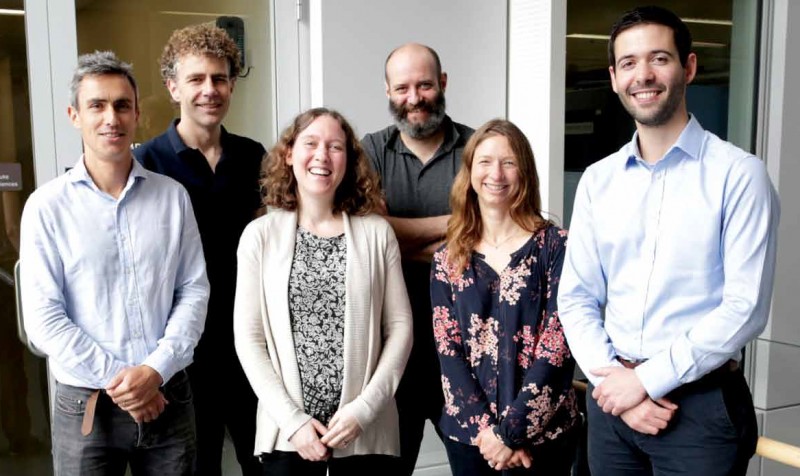By Sophie Arthur
March 20, 2018
Time to read: 5 minutes

The London Institute of Medical Sciences (LMS) Chain-Florey workshop, an annual event that celebrates the research accomplishments of our clinicians in training, took place on 17 January this year and included talks by Drs’. Julie Glanville, Jocelyn Walbridge and Ceris Owen. Their presentations described the killing efficacy of T-cells, modelling germ cell tumours in worms, and studies of epigenetic deregulation in cell signalling and cancer. These talks exemplify the rich diversity of research being undertaken by clinicians at the LMS.
The workshop began with a keynote lecture from Professor Sir Adrian Bird. His pioneering research on DNA methylation has transformed epigenetics and shown the underlying causes of Rett syndrome, a rare X-linked disorder that predominantly affects girls. Professor Bird’s rigorous and meticulous research showed how mechanistic insights in model organisms could be used to guide translational strategies aimed at treating or curing disease. Although he joked that his A-levels were not good enough to get him into medical school, his research revealed new routes to cure a disease previously thought to be progressive and irreversible. This message of ‘discovery’ exemplifies what the Chain-Florey scheme is all about and was the perfect ‘opener’ for the half-day meeting.
The research talks ended with the (now infamous) panel discussion that this year was entitled “Lost in Translation? Should clinicians do basic research?” As one might expect, a wide-range of opinions were expressed from the panels basic and clinical scientists. The discussion was thought provoking, with the panel sharing their experiences and thoughts on the opportunities and challenges associated with clinicians doing basic research within their medical training. Professors Liz Lightstone (renal medicine), Austin Smith (stem cell biology), Irene Roberts (paediatric haematology), Matthew Pickering (rheumatology) and Jonathan Weber (HIV/communicable diseases) discussed their experiences with Dr Julia Dickinson, MRC Programme Manager for Clinical Careers Strategy. The event was masterfully chaired by Dr Harry Leitch, a Chain-Florey Lecturer and recently appointed Head of the Germline and Pluripotency group at LMS.
Liz Lightstone started the discussion off expressing the view that for clinicians to be able to translate cutting edge science and provide the best patient care there is a critical need for them to understand, and ideally, have hands-on experience of basic research. Austin Smith countered with the warning that the same rigorous standards that apply to basic scientists undertaking PhDs, must be applied to clinicians entering laboratories, otherwise there is a risk of animosity and the worry that we might deprive wards of talented clinicians to no real end. Jonathan Weber, acting Dean of the Faculty of Medicine at Imperial College, spoke passionately of the challenges he faced being the only clinician in a basic science environment, but emphasised how important these formative years were to his future success in academic medicine.
As the panel’s debate came to a close the audience were eager to contribute and to ask questions of both the panel and the chair. The discussion ended on an overwhelmingly positive note in response to the deliberately provocative question. Challenges still exist in navigating dual clinical and research training but the MRC’s Julia Dickinson captured the mood brilliantly by emphasising that “true innovation often comes from people working in interdisciplinary ways”. Putting the right people into different environments and allowing them to learn and share knowledge, can create huge benefits in terms of improving scientific understanding and ultimately improving medical care.
Dr Harry Leitch, who organised this year’s workshop, was eager to attract a broad community from across the spectrum of science and medicine, and this was reflected in the choice of speakers, panellists and his encouragement of attendance and contributions from across the LMS and the wider Faculty of Medicine. As part of his drive to encourage wider engagement, Harry advised on a redesign of the Chain-Florey branding, to create an updated, new look to parallel the progressive nature of the scheme. Harry said, “I am passionately in favour of providing clinicians with an entry point to undertake high quality basic research at all stages of their training. I was delighted to organise this year’s workshop and hope to be involved going forwards in promoting this fantastic scheme in London and beyond, so that we continue to attract clinicians with the energy, drive and creativity to make the most of the fantastic opportunities available at LMS. If this is you, get in touch!”
Outside of the workshop, the LMS continues to develop and extend the Chain-Florey programme. 2018 sees the introduction of Senior Clinical Lectureships, which are currently being advertised, applications close on 31 March 2018. This is an exciting addition to the programme and illustrates the continuing and innovative commitment that LMS has to the scheme.
The Chain-Florey research scheme is supported by the National Institute for Health Research (NIHR) Biomedical Research Centre based at Imperial College Healthcare NHS Trust and Imperial College London.
For more about the history of the scheme and the current and past fellows and lecturers, have a look at the brochure above. If you want a hard copy please get in contact with the Grants, Engagement and Communications (GECo) facility, .